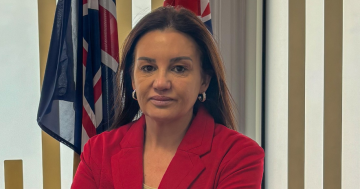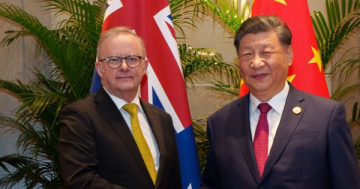
FECCA CEO Mary Ann Geronimo, Race Discrimination Commissioner Giridharan Sivaraman and Chair of FECCA Peter Doukas launching the anti-racism framework at Parliament House. Photo: James Day.
Australia’s Race Discrimination Commissioner Giridharan Sivaraman has launched what he is describing as the most comprehensive plan Australia has ever seen for eliminating racism across the nation.
With 63 recommendations for a whole-of-society approach to the issue, the plan proposes reforms across Australia’s legal, justice, health, education, media and arts sectors.
A key recommendation calls on the Federal Government to establish a Federal Government to establish a National Anti-Racism Taskforce to introduce a dedicated strategy for eliminating racism experienced by First Nations peoples.
The National Anti-Racism Framework calls for action to improve the national understanding of racism in order to inform the implementation of all anti-racism initiatives, programs and policies.
Commissioner Sivaraman discussed the plan during a launch event at Parliament House on Wednesday (27 November).
“This is a historic moment in the fight against racism. For the first time, we have a comprehensive plan for eliminating racism in Australia,” he said.
“Racism diminishes a person’s sense of self and corrodes one’s soul. In doing so, it corrodes the soul of our nation.
“We all want to live in a world where everyone can thrive in ways that are important to them, regardless of their identity. Here in Australia, we like to think we’re the land of the fair go, but the reality is very different for many people who are affected by racism.”
The Australian Human Rights Commission developed the framework with dedicated funding from the Federal Government and follows three years of extensive consultations with community organisations, service providers, government agencies and other stakeholders
It seeks to provide a roadmap for all levels of government, business and community organisations to address all forms of racism.
“Throughout our consultation process, we heard consistently from First Nations and other negatively racialised people that systemic racism is deeply embedded throughout Australia and requires an urgent national response,” the Commissioner said.
“The racism that history has baked into our systems and institutions means many negatively racialised people in Australia – especially First Nations people – have poor health, education and employment outcomes, are over-represented in the justice system and are negatively represented in the media.
“With alarming rises in racist behaviour during recent times, we’re at a critical juncture in the journey to address racism in Australia. Interpersonal racism is one symptom of the disease of systemic racism.
“Even if you don’t see that symptom, the disease still causes much damage across people’s lives and needs to be treated.”
Federation of Ethnic Communities Councils of Australia (FECCA) chair Peter Doukas and chief executive officer Mary Ann Geronimo also attended the Parliament House event.
“Australia prides itself on being a successful multicultural nation. However, it is important to recognise that embracing multiculturalism does not mitigate the issue of racism,” Mr Doukas said.
“In fact, in highly culturally diverse societies like Australia, it’s vital we all work together to ensure we translate support for multiculturalism into genuine equity and inclusivity for all.
“The National Anti-Racism Framework is a guide for delivering a society that works for everyone and implementing its recommendations should be a priority for governments, businesses and communities across our country.”
Just moments before the launch event, and just a few steps away, the Senate burst into uproar over racism claims, with independent Senator Fatima Payman accusing One Nation leader Pauline Hanson of “vile racism” in the chamber.
It was in response to Senator Hanson questioning whether Senator Payman was eligible to be an Australian senator due to her Afghan citizenship.
The One Nation leader raised a motion seeking to determine whether Senator Payman should be excluded from parliament under Section 44c of the Constitution.
Senator Payman has taken all possible steps to denounce her Afghan citizenship but has been thwarted by that nation’s Taliban rule and, therefore, qualifies to be a federal parliamentarian in Australia.
Senator Payman was outraged at the questioning and repeatedly accused Senator Hanson of racism and was repeatedly forced to withdraw the comments.
Independent Senator Lidia Thorpe tore up Senator Hanson’s motion and threw the torn papers at her.
Senator Thorpe was later suspended from the Senate for her actions.
Earlier in the day, she and Greens senator Mehreen Faruqi moved a motion to investigate racism in the Federal Parliament.
“We’re calling on the parliament, on the senators, to support our inquiry to ensure our workplace is a safe one and we don’t have to deal with disgusting racism every time we open our mouths in our workplace,” Senator Thorpe said.
That motion failed.















